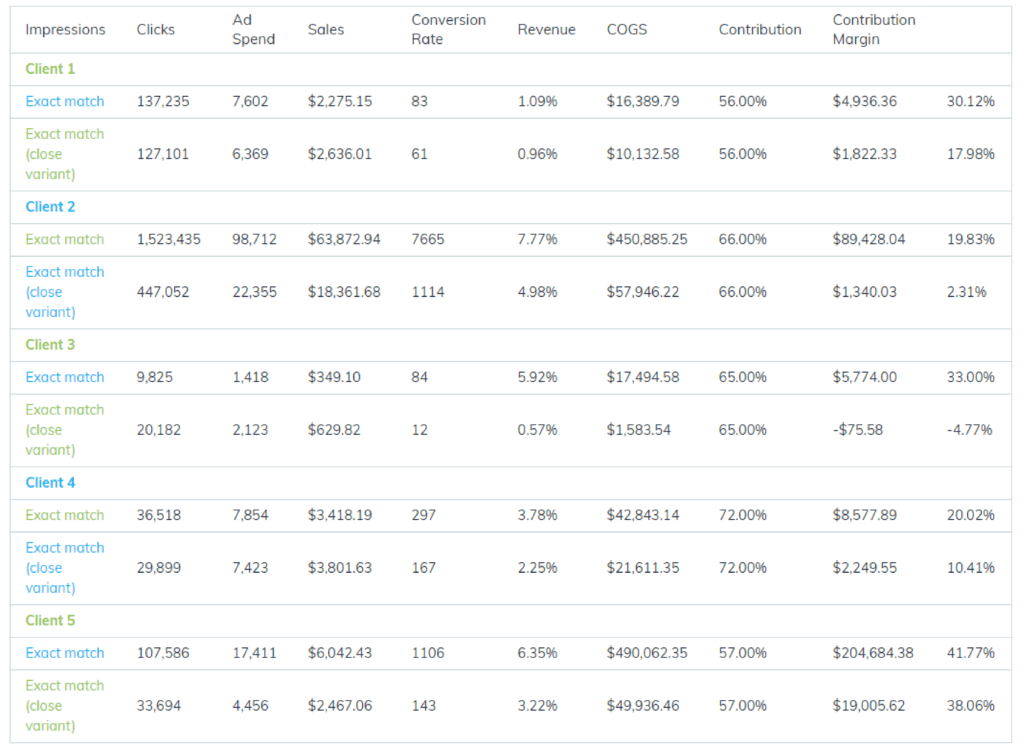Recently, a client’s search campaign performance dipped, and one of our analysts did some digging to find out why. What he found represented a startling shift in Google’s match types: “close variants” are not always very close at all! In fact, in many cases, these variants don’t represent the exact keywords well at all – and performance reflects that. Here’s what we discovered in the search campaigns we manage, and the implications of this trend.

About Close Variants
For all campaigns, Google divides search terms into different match types. For search, these types are broad, phrase, and exact match. Each of these types is also eligible to serve “close variants,” which Google defines as “searches that are similar, but not identical to the targeted keyword.”
Google limits these variants to :
- Words with closely related syntax (misspellings, singular or plural forms, abbreviations,etc. Reordered words with the same meaning
- Terms with added or removed function words (like prepositions, conjunctions, and articles)
- Implied words
- Synonyms and paraphrases
- Words with the same search intent
Previously, exact match keywords were a way to narrowly target your campaigns. As the definition of exact match has expanded, these keywords are beginning to more closely resemble broad match. Many of the terms that were supposedly “close variants” in our accounts really didn’t reflect the search term. Sometimes, the term itself had multiple meanings, not all of which reflected the products our client had available for sale. As one analyst put it, “At a certain point, why even have match types?”
For example, let’s consider a hypothetical hockey supplier. They sell face shields, among other hockey equipment. The problem is this: face shields are also sometimes referred to as “face masks.” (Check out this example search below!)

As you can see – hockey gear is seen above alongside personal protective facemasks – not the same product by a long shot! We did, though, see similar issues across several of our clients’ campaigns. Take a look at some of the terms considered “close variants” compared to our keywords:

Some of these are somewhat similar – “personalface masks” vs custom face masks – but others are very different! Someone looking to buy “Sugar Free Cookies,” for instance, probably isn’t trying to bake the cookies themselves – rendering “sugar free cookie recipes” useless.
Furthermore, we found that close variants produced dramatically different results for the advertiser compared to exact match terms. Here is a comparison of the two match types over the last 30 days for several clients across multiple industries:

As you can see, the exact match terms universally outperformed the close variants, even in cases where impressions and clicks were almost the same. Conversion rates trended much lower, and naturally, so did sales and revenue. In one case, these close variants were actually consuming profit produced by exact matches (-5% over the last 30 days.)
Now we’ve identified the problem – but what can our analysts do about it? Unfortunately, not much.
Google doesn’t allow you to opt out of including close variants, for any match type. Negative keyword lists are an obvious answer, but in this case they’re likely to cause as many problems as they solve. First, you’d need to only apply the negatives to the specific ad group where the variant appeared. Otherwise, your ads won’t be able to serve on the query at all – bad news if you also happen to be running broad match campaigns.
Even when applied on the ad group level, a negative keyword strategy isn’t foolproof. True, the term will no longer be eligible to appear in one ad group, but nothing prevents those same queries from serving as a close match variant on a different (but similar) keyword in a different ad group!
A profit-driven strategy can help mitigate these issues, by allowing you to adjust bids according to the aggregate performance of the keywords in the ad groups, including close variants.This strategy will by design favor ad groups that produce the most profit for the business – regardless of whether that profitability is produced by keywords or their variants. It won’t prevent unproductive close variants from dragging down otherwise profitable keyword groupings, though – meaning advertisers will continue to see some wasted spend.
We’re still working on ways to prevent these close variants from impacting campaigns. Stay tuned to see what we find! In the meantime, let us know if you’re seeing any similar trends across your campaigns. We’d love to hear how these variants are performing for your search ads.








